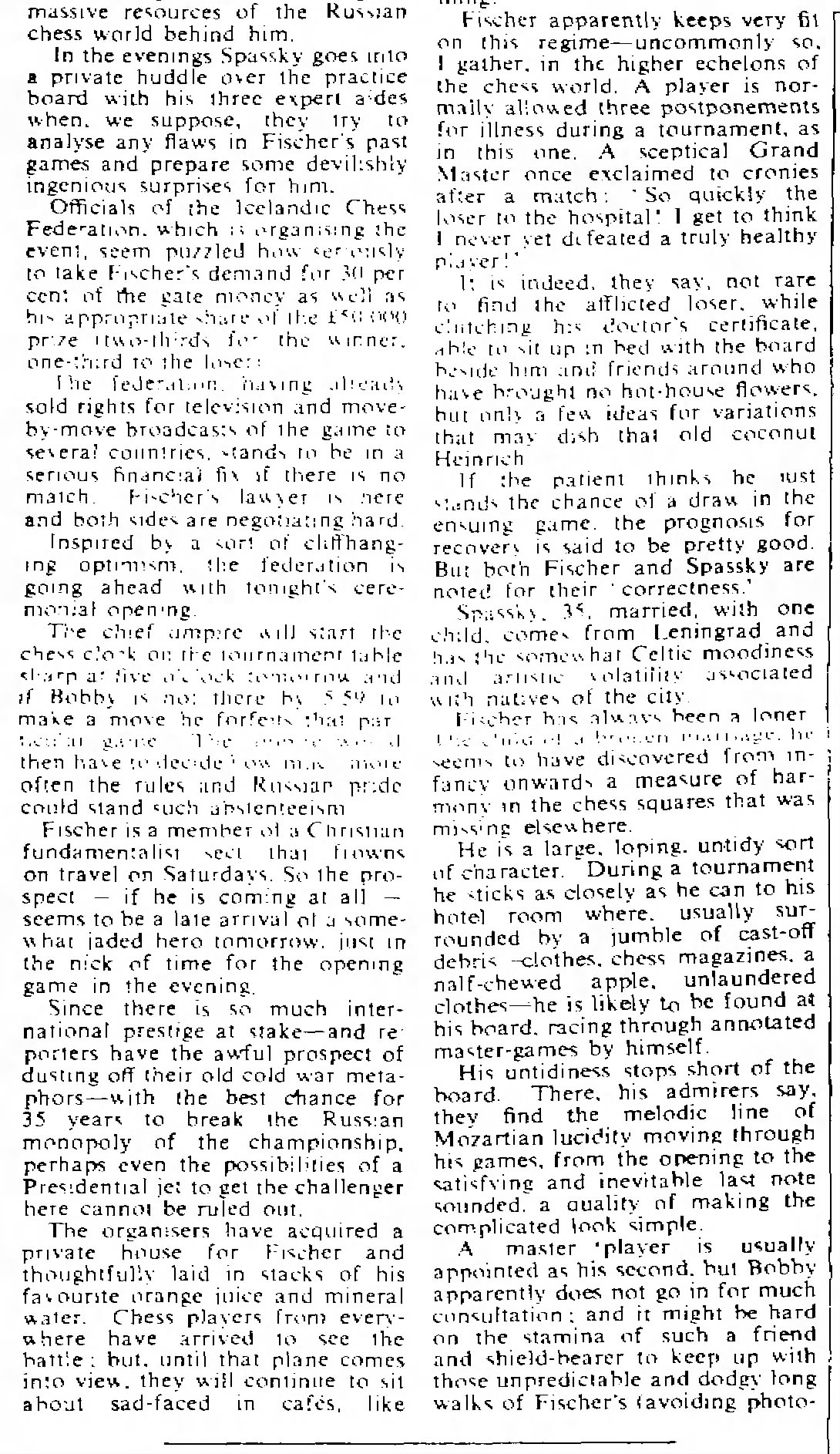The Observer London, Greater London, England Sunday, July 02, 1972 - Page 5
Fischer non-move Baffles Icelandic Chessmen by Roy Perrott
Reykjavik, July 1 — WAITING for the elusive Bobby Fischer to arrive here to make his challenge for the World Chess Championships has become a severe test of patience as well as nerve.
Some think that the 29-year-old prodigy from Brooklyn may be using delaying tactics to unsettle the Russians. If so, it is not affecting the primary target too noticeably, though causing much confusion.
The champion, Boris Spassky, looks outwardly in beamingly good form, playing a little tennis, putting in some restful afternoon naps, no doubt taking comfort in having the massive resources of the Russian chess world behind him.
In the evenings Spassky goes into a private huddle over the practice board with his three expert aides when, we suppose, they try to analyse any flaws in Fischer's past games and prepare some devilishly ingenious surprises for him.
Officials of the Icelandic Chess Federation, which is organizing the event, seem puzzled how seriously to take Fischer's demand for 30 per cent of the gate money as well as his appropriate share of the £150,000 prize two-thirds for the winner, one-third to the loser.
The federation, having already sold rights for television and move-by-move broadcasts of the game to several countries, stands to be in a serious financial fix if there is no match. Fischer's lawyer is here and both sides are negotiating hard.
Inspired by a sort of cliffhanging optimism, the federation is going ahead with tonight's ceremonial opening.
The chief umpire will start the chess clock on the tournament table sharp at five o'clock tomorrow and if Bobby is not there by 5:59 to make a move he forfeits that particular game. The ([illegible]) then have to decide how ([illegible]) more often the rules and Russian pride could stand such absenteeism.
Fischer is a member of a Christian fundamentalist sect that frowns on travel on Saturdays. So the prospect — if he is coming at all — seems to be a late arrival of a somewhat jaded hero tomorrow, just in the nick of time for the opening game in the evening.
Since there is so much international prestige at stake —and reporters have the awful prospect of dusting off their old cold war metaphors—with the best chance for 35 years to break the Russian monopoly of the championship, perhaps even the possibilities of a Presidential jet to get the challenger here cannot be ruled out.
The organizers have acquired a private house for Fischer and thoughtfully laid in stacks of his favourite orange juice and mineral water. Chess players from everywhere have arrived to see the battle; but, until that plane comes into view, they will continue to sit about sad-faced in cafes, like deprived children kept waiting for dreamed-of goodies.
Fischer has been a rare phenomenon ever since he became Grand Master at the age of 15. Some have described him as the greatest player in history.
Perhaps a year ago, some experts would have given the powerful and more experienced Spassky the edge in this encounter. But Fischer's cannon-ball style of defeating three Grand Masters, two Russian and one Danish, one after the other during the earlier rounds now persuades most of the cognoscenti that Fischer should be reckoned marginally favourite in a close-run thing.
Fischer apparently keeps very fit on this regime—uncommonly so, I gather, in the higher echelons of the chess world. A player is normally allowed three postponements for illness during a tournament, as in this one. A sceptical Grand Master once exclaimed to cronies after a match: “So quickly the loser to the hospital! I get to think I never yet defeated a truly healthy player!”
It is indeed, they say, not rare to find the afflicted loser, while clutching his doctor's certificate, able to sit up in bed with the board beside him and friends around who have brought no green-house flowers, but only a few ideas for variations that may dish that old coconut Heinrich.
If the patient thinks he just stands the chance of a draw in the ensuing game, the prognosis for recovery is said to be pretty good. But both Fischer and Spassky are noted for their ‘correctness.’
Spassky, 35, married, with one child comes from Leningrad and has somewhat Celtic moodiness and artistic volatility associated with natives of the city.
Fischer has always been a loner, seems to have discovered from infancy onwards a measure of harmony in the chess squares that was missing elsewhere.
His admirers say, they find the melodic line of Mozartian lucidity moving through his games, from the opening to the satisfying and inevitable last note sounded, a quality of making the complicated look simple.
A master player is usually appointed as his second, but Bobby apparently does not go in for much consultation; and it might be hard on the stamina of such a friend and shield-bearer to keep up with those unpredictable and dodgy long walks of Fischer's avoiding photographers and T-bone steaks at midnight after a day of chess and starvation.
I asked the British Master Harry Golombek (who will be reporting progress of the match for THE OBSERVER) what he thought of Fischer's chances. He is inclined to think he will win, though notes one weakness of his as a rather narrow repertoire of openings which the Russians might profitably study and exploit.
But to see anything at all, fast or slow, our desperate need is to have that genius stepping out at the airport.

 Fischer non-move Baffles Icelandic Chessmen 02 Jul 1972, Sun The Observer (London, Greater London, England) Newspapers.com
Fischer non-move Baffles Icelandic Chessmen 02 Jul 1972, Sun The Observer (London, Greater London, England) Newspapers.com























